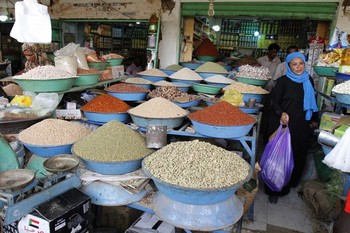Sudan’s inflation dips to 28.2% in October
November 12, 2014 (KHARTOUM) – Sudan’s Central Bureau of Statistics (CBuoS) said the monthly inflation rate has dropped for the third consecutive month to reach 28.2% in October compared to 39.2% in September.

The CBuoS October bulletin on inflation rate pointed that the average price index of consumer goods was relatively stable during October, saying the increase did not exceed 0.06% and settled at 459.8 points compared to 459.5 in September.
According to the bulletin, the price index of the food and drinks items was 52.89% and registered 482.23 points compared to 482.20 in September.
The CBuoS also mentioned that the average price of four consumer good items which amounts to 24.8% of the total consumer spending has registered a significant decline in October.
It also reported that prices of legumes and vegetables declined by 2.5% and prices of fish and seafood declined by 2.0% while prices of bread and grains declined by 0.4% and prices of fruits declined by 0.8%.
Prices of other components of the group have witnessed a slight increase while there were variations in prices of consumer goods groups other than food and drinks group.
The drop in inflation rate coincides with a slight increase in the value of the Sudanese pound against the US dollar. The exchange rate of the US dollar dropped on the black market in Khartoum in the last month settling at 8.7 Sudanese pounds (SDG) compared to 9.50 (SDG).
Traders in the black market had previously told Sudan Tribune they expect the dollar price to decrease to 8 SDG.
The official dollar exchange rate stated by the Central Bank of Sudan (CBoS) is 5.8 SDG.
Sudan’s economy was hit hard since the southern part of the country declared independence in July 2011, taking with it about 75% of the country’s oil output.
The Sudanese pound has lost more than half its value since South Sudan’s secession, pushing inflation rates to record levels given that the East African nation imports most of its food.
(ST)
